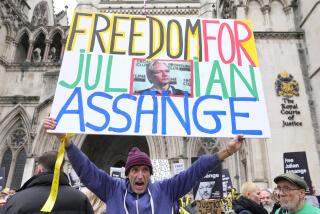Snowden accuses Obama of ‘deception,’ punishing him with exile

Fugitive NSA leaker Edward Snowden issued a plaintive appeal Monday from his diplomatic limbo at a Moscow airport, accusing the Obama administration of using the “bad tools of political aggression” to render him stateless.
Snowden, whose U.S. passport was revoked after he began his globe-trotting flight from justice for leaking national security secrets, lamented in a statement posted on the WikiLeaks website that President Obama was obstructing his right to seek asylum by threatening countries willing to grant it.
Snowden has been holed up in a transit area of Moscow’s Sheremetyevo airport for more than a week and the strain of being trapped in a judicial standoff of his own making was palpable in his accusatory statement.
“One week ago I left Hong Kong after it became clear that my freedom and safety were under threat for revealing the truth,” the former National Security Agency contractor began.
After thanking friends, family and anonymous supporters for helping him retain his “liberty,” he accused Obama of diplomatic strong-arming countries “from which I have requested protection to deny my asylum petitions.
“This kind of deception from a world leader is not justice, and neither is the extra-legal penalty of exile,” Snowden wrote. “These are the old, bad tools of political aggression. Their purpose is to frighten, not me, but those who would come after me.”
Snowden remains a U.S. citizen and administration officials have said his return to the United States would be facilitated if he decides to face the espionage charges brought against him.
“The Obama administration has now adopted the strategy of using citizenship as a weapon,” Snowden lamented. “Although I am convicted of nothing, it has unilaterally revoked my passport, leaving me a stateless person.”
He was issued special travel documents by Ecuadorean diplomats in Moscow last week. However, officials in Ecuador’s capital, Quito, canceled them, saying they were provided without proper authorization.
Ecuadorean officials initially hinted they would give refuge to the 30-year-old American. But the South American country could face serious economic consequences for rejecting any U.S. extradition request as $400 million in trade -- and 40,000 related jobs -- could be lost if Washington refuses to renew a trade pact with Quito that expired Sunday.
The unspoken threat may be behind the foot-dragging and retreat by Ecuador in the Snowden affair, even as the South American government publicly declared it would pull out of the trade deal of its own accord rather than face U.S. “blackmail.” Ecuadorean officials said late last week that any grant of political asylum would take months to decide and would have to take into consideration any negative consequences in its relations with Washington.
Russian President Vladimir Putin earlier Monday said Snowden could stay in Russia but only if he agreed to cease disclosing classified information that was “aimed at damaging our American partners.”
Other Russian officials disclosed to local news media that Snowden had submitted a request for asylum in Russia and 14 other countries, although they did not specify which other states he had approached.
ALSO:
Egypt’s military gives President Morsi 48 hours to resolve crisis
Pro-democracy protest in Hong Kong draws tens of thousands
Obama says Nelson Mandela showed the power of ‘acting on our ideas’
More to Read
Sign up for Essential California
The most important California stories and recommendations in your inbox every morning.
You may occasionally receive promotional content from the Los Angeles Times.











